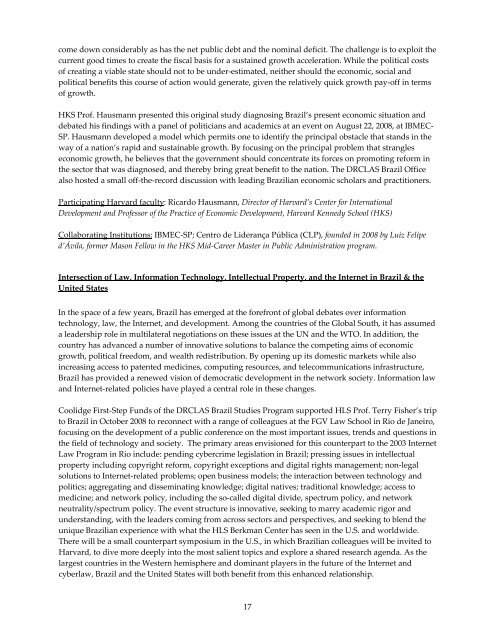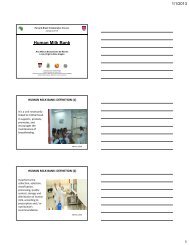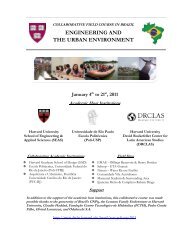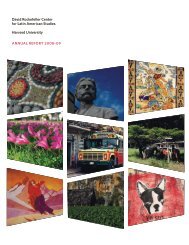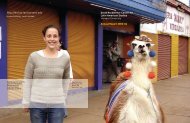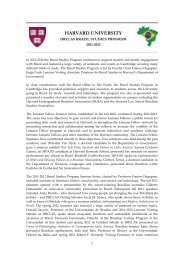Harvard - Brazil Office - DRCLAS - David Rockefeller Center for ...
Harvard - Brazil Office - DRCLAS - David Rockefeller Center for ...
Harvard - Brazil Office - DRCLAS - David Rockefeller Center for ...
Create successful ePaper yourself
Turn your PDF publications into a flip-book with our unique Google optimized e-Paper software.
come down considerably as has the net public debt and the nominal deficit. The challenge is to exploit the<br />
current good times to create the fiscal basis <strong>for</strong> a sustained growth acceleration. While the political costs<br />
of creating a viable state should not to be under‐estimated, neither should the economic, social and<br />
political benefits this course of action would generate, given the relatively quick growth pay‐off in terms<br />
of growth.<br />
HKS Prof. Hausmann presented this original study diagnosing <strong>Brazil</strong>’s present economic situation and<br />
debated his findings with a panel of politicians and academics at an event on August 22, 2008, at IBMEC‐<br />
SP. Hausmann developed a model which permits one to identify the principal obstacle that stands in the<br />
way of a nation’s rapid and sustainable growth. By focusing on the principal problem that strangles<br />
economic growth, he believes that the government should concentrate its <strong>for</strong>ces on promoting re<strong>for</strong>m in<br />
the sector that was diagnosed, and thereby bring great benefit to the nation. The <strong>DRCLAS</strong> <strong>Brazil</strong> <strong>Office</strong><br />
also hosted a small off‐the‐record discussion with leading <strong>Brazil</strong>ian economic scholars and practitioners.<br />
Participating <strong>Harvard</strong> faculty: Ricardo Hausmann, Director of <strong>Harvard</strong>’s <strong>Center</strong> <strong>for</strong> International<br />
Development and Professor of the Practice of Economic Development, <strong>Harvard</strong> Kennedy School (HKS)<br />
Collaborating Institutions: IBMEC‐SP; Centro de Liderança Pública (CLP), founded in 2008 by Luiz Felipe<br />
d’Ávila, <strong>for</strong>mer Mason Fellow in the HKS Mid‐Career Master in Public Administration program.<br />
Intersection of Law, In<strong>for</strong>mation Technology, Intellectual Property, and the Internet in <strong>Brazil</strong> & the<br />
United States<br />
In the space of a few years, <strong>Brazil</strong> has emerged at the <strong>for</strong>efront of global debates over in<strong>for</strong>mation<br />
technology, law, the Internet, and development. Among the countries of the Global South, it has assumed<br />
a leadership role in multilateral negotiations on these issues at the UN and the WTO. In addition, the<br />
country has advanced a number of innovative solutions to balance the competing aims of economic<br />
growth, political freedom, and wealth redistribution. By opening up its domestic markets while also<br />
increasing access to patented medicines, computing resources, and telecommunications infrastructure,<br />
<strong>Brazil</strong> has provided a renewed vision of democratic development in the network society. In<strong>for</strong>mation law<br />
and Internet‐related policies have played a central role in these changes.<br />
Coolidge First‐Step Funds of the <strong>DRCLAS</strong> <strong>Brazil</strong> Studies Program supported HLS Prof. Terry Fisher’s trip<br />
to <strong>Brazil</strong> in October 2008 to reconnect with a range of colleagues at the FGV Law School in Rio de Janeiro,<br />
focusing on the development of a public conference on the most important issues, trends and questions in<br />
the field of technology and society. The primary areas envisioned <strong>for</strong> this counterpart to the 2003 Internet<br />
Law Program in Rio include: pending cybercrime legislation in <strong>Brazil</strong>; pressing issues in intellectual<br />
property including copyright re<strong>for</strong>m, copyright exceptions and digital rights management; non‐legal<br />
solutions to Internet‐related problems; open business models; the interaction between technology and<br />
politics; aggregating and disseminating knowledge; digital natives; traditional knowledge; access to<br />
medicine; and network policy, including the so‐called digital divide, spectrum policy, and network<br />
neutrality/spectrum policy. The event structure is innovative, seeking to marry academic rigor and<br />
understanding, with the leaders coming from across sectors and perspectives, and seeking to blend the<br />
unique <strong>Brazil</strong>ian experience with what the HLS Berkman <strong>Center</strong> has seen in the U.S. and worldwide.<br />
There will be a small counterpart symposium in the U.S., in which <strong>Brazil</strong>ian colleagues will be invited to<br />
<strong>Harvard</strong>, to dive more deeply into the most salient topics and explore a shared research agenda. As the<br />
largest countries in the Western hemisphere and dominant players in the future of the Internet and<br />
cyberlaw, <strong>Brazil</strong> and the United States will both benefit from this enhanced relationship.<br />
17


